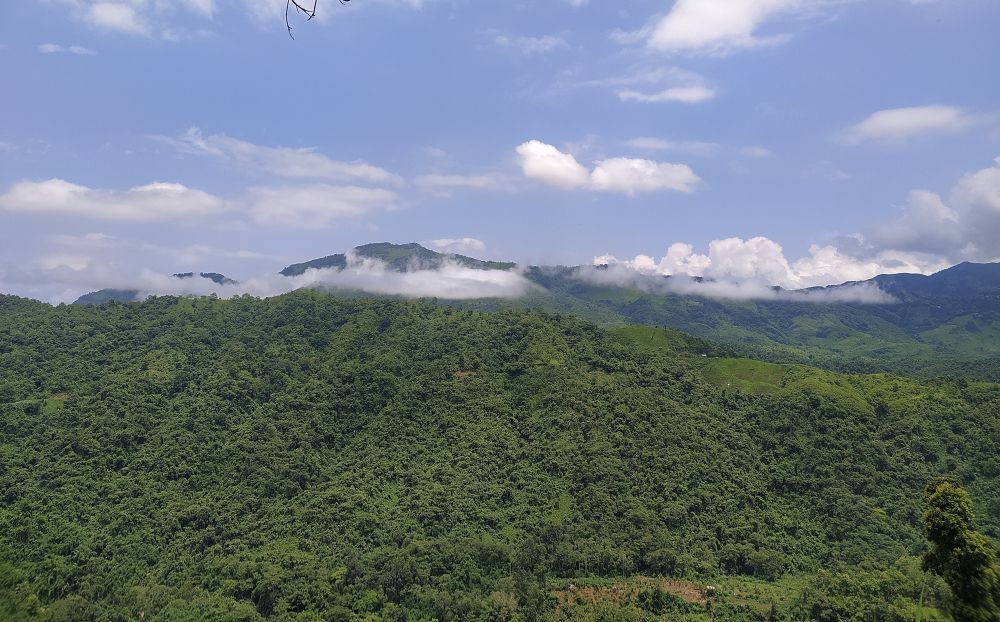Forest covered mountains in Wokha district. With the effects of climate change being continuously felt, it has become imperative that efforts and investments are made to mitigate the consequences of environmental degradation. (Morung File Photo)

April 22 is Earth Day
Vibi Yhokha Sophie
Kohima | April 21
A reminder of our responsibility to protect the planet for future generations, Earth Day is commemorated annually to build awareness and education of environmental issues affecting the planet and to honor the achievement of the environmental movement.
Nagaland is no stranger to the impacts of global warming and climate crisis as it has been witnessing climate variations in recent years from shifting rainfall patterns to rising temperatures and weather outbursts.
“We have already started to experience the impact of global climate crisis. There's no single reason to the cause of climate crisis in Nagaland but a contribution of several,” says RJ Viketuno Hiekha, a nature enthusiast, citing the dependence on vehicles for trivial daily tasks, concrete jungles with no green spaces, unsustainable ways of jhum cultivation, depletion of forests, landfills and land use in agricultural activities which is increasing one's carbon footprints.
From a scientific perspective, calling it climate change is difficult in the absence of data which requires 40 years to have a concrete idea, says Kenilo Kessen, Team Member, Nagaland State Climate Change Cell, Nagaland Science & Technology Council (NASTEC).
However, according to Kessen, some of the factors that indicate climate variations are biological indicators, especially lichens and moss that determines the quality of air in an area. Kessen also points out the significance of the Forest Survey of India 2019-2021 report which mentions a 235 square kilometre decline in forest cover in Nagaland (India State of Forest Report 2021 prepared by the FSI)
“The decrease in forest cover and erratic patterns of rainfall are indicators of the climate changing,” highlights Kessen.
Due to the lack of data and studies in Nagaland, Hukato Chishi, IFS, Member Secretary, Nagaland Pollution Control Board (NPCB), also notes the complexity in pointing out the impacts of climate change in the State. However, Chishi states that Nagaland is also witnessing increase in temperature, erratic rainfall, floods which can be attributed to climate change.
Meziwang Zeliang, Team Member, Nagaland State Climate Change Cell, Nagaland Science & Technology Council (NASTEC) mentions that anthropogenic activities such as migration to urban cities, overpopulation can be indirect indicators of climate variations.
Zeliang further highlights that agriculture is one sector that has been significantly affected by climate variations. Migration of crop plantation to elevated altitudes is one instance.
“Another impact in the food chain is the infestation of new pests in crops. We don't know if there is a direct linkage but it could be triggered by climate change,” states Zeliang.
This year's Earth Day theme ‘Invest in our Planet' focuses on engaging governments, institutions, businesses, and citizens to commit to their part – “everyone accounted for, everyone accountable”.
Researchers Kessen and Zeliang highlight the need for governments to develop action plans and policies through careful analysis of findings, and streamlining priorities in terms of the vulnerability and adaptability of each district.
Meanwhile, Hiekha stresses on the need for the government to develop initiatives that are friendly to tribal societies, and not merely import ideas and practices which may not be necessarily practical.
“Government, civil societies, businesses and citizens need to meet at a common space for action towards a resilient climate. Reforestation and afforestation with endemic specie trees can boost our biodiversity and trap carbon dioxide at atmosphere,” adds Hiekha optimistic that indigenous practices for sustainable living can provide scope. Sensitisation, mobilization and creation of awareness on climate literacy is a priority, emphasizes Keppen.
In this regard, the Nagaland State Climate Change Cell, Nagaland Science & Technology Council (NASTEC) initiated a pilot programme called Climate Change Awareness Programme (CCAP)—a participatory programme based on action based learning method- which is conducted in educational institutions.
“It's not just about planting trees, it starts right at home in simple things like switching off the lights, carpooling,” adds Keppen. Chishi also underscored the importance of “aligning one’s lifestyle and habits in a way that does not affect the environment.” “Reduce, Reuse and Recycle are the crux of environmental solutions. It costs us nothing but to move beyond our comfort zone,” affirms Hiekha.






